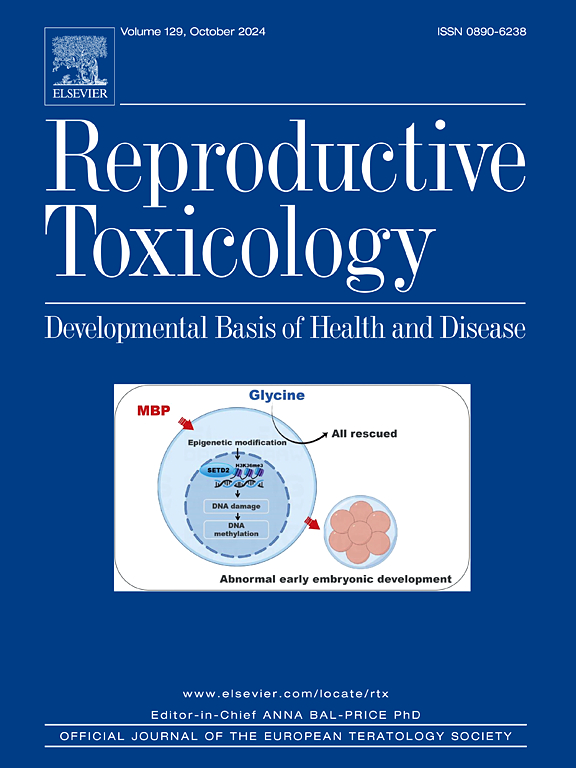原儿茶醛通过SIRT1/p53轴抑制颗粒细胞凋亡和衰老,改善环磷酰胺诱导的卵巢早衰
IF 3.3
4区 医学
Q2 REPRODUCTIVE BIOLOGY
引用次数: 0
摘要
卵巢早衰(POI)是一种常见的妇科疾病。环磷酰胺(Cyclophosphamide, CP)作为一种化疗药物,在诱导POI中起着特别重要的作用。原儿茶醛(PCA)是中药丹参中的一种主要酚酸,具有抗炎、抗细胞凋亡和抗氧化作用。我们的目的是研究不同剂量的PCA对卵巢功能的影响及其潜在的分子机制。给予PCA可减轻发情周期紊乱,增加卵巢重量,促进血清激素分泌,改善cp损伤的卵巢微环境。重要的是,PCA通过抑制颗粒细胞的衰老和凋亡,有助于POI患者卵巢功能的恢复。体外实验进一步证实了PCA对cp诱导的颗粒细胞衰老和凋亡的保护作用。从机制上讲,体内和体外实验都证明,PCA可以促进Sirt1/p53信号级联的激活,最终改善卵巢功能。综上所述,PCA对cp诱导POI的卵巢损伤可能具有保护作用,这可能与其通过Sirt1/p53通路抑制颗粒细胞衰老和凋亡有关。本文章由计算机程序翻译,如有差异,请以英文原文为准。
Protocatechualdehyde improves cyclophosphamide-induced premature ovarian insufficiency by inhibiting granulosa cell apoptosis and senescence through the SIRT1/p53 axis
Premature ovarian insufficiency (POI) is a prevalent gynecological disorder. Cyclophosphamide (CP), as a chemotherapeutic drug, particularly plays an important role in inducing POI. Protocatechualdehyde (PCA) is a major phenolic acid in Chinese herb Danshen, and has been reported to have beneficial effects on anti-inflammatory, anti-apoptotic, and anti-oxidant functions. We aimed to investigate the effect of different doses of PCA on ovarian function and the underlying molecular mechanisms. PCA administration reduced estrous cycle disorders, increased ovarian weight, promoted the secretion of serum hormone levels, and improved the CP-damaged ovarian microenvironment. Importantly, the administration of PCA contributed to the recovery of ovarian function with POI by inhibiting the senescence and apoptosis of granulosa cells. In vitro assay further confirmed the protective effect of PCA on CP-induced senescence and apoptosis of granulosa cells. Mechanistically, both in vivo and in vitro experiments proved that PCA administration promoted activation of the Sirt1/p53 signaling cascade, ultimately improving ovarian function. In conclusion, PCA might protect against ovarian damage in CP-induced POI that might be related to its activity on senescence and apoptosis of granulosa cells by the Sirt1/p53 pathway.
求助全文
通过发布文献求助,成功后即可免费获取论文全文。
去求助
来源期刊

Reproductive toxicology
生物-毒理学
CiteScore
6.50
自引率
3.00%
发文量
131
审稿时长
45 days
期刊介绍:
Drawing from a large number of disciplines, Reproductive Toxicology publishes timely, original research on the influence of chemical and physical agents on reproduction. Written by and for obstetricians, pediatricians, embryologists, teratologists, geneticists, toxicologists, andrologists, and others interested in detecting potential reproductive hazards, the journal is a forum for communication among researchers and practitioners. Articles focus on the application of in vitro, animal and clinical research to the practice of clinical medicine.
All aspects of reproduction are within the scope of Reproductive Toxicology, including the formation and maturation of male and female gametes, sexual function, the events surrounding the fusion of gametes and the development of the fertilized ovum, nourishment and transport of the conceptus within the genital tract, implantation, embryogenesis, intrauterine growth, placentation and placental function, parturition, lactation and neonatal survival. Adverse reproductive effects in males will be considered as significant as adverse effects occurring in females. To provide a balanced presentation of approaches, equal emphasis will be given to clinical and animal or in vitro work. Typical end points that will be studied by contributors include infertility, sexual dysfunction, spontaneous abortion, malformations, abnormal histogenesis, stillbirth, intrauterine growth retardation, prematurity, behavioral abnormalities, and perinatal mortality.
 求助内容:
求助内容: 应助结果提醒方式:
应助结果提醒方式:


